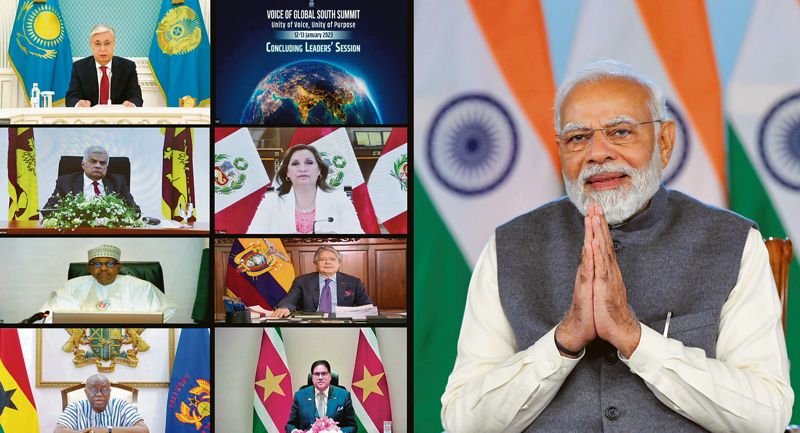
Voices and Concerns of the Global South
Ambassador (Retd.) Asoke Mukerji
The voices and concerns of developing countries in the UN, collectively referred to as the “Global South”, prioritize peace, security, and development. These objectives require an integrated framework for international cooperation, with the Global South participating on an equal basis in its decision-making.
The collective identity of the Global South began to emerge at the UN General Assembly (UNGA) in December 1963, when developing countries initiated two significant amendments to the UN Charter of June 1945 for greater representation in the organs of the UN. These amendments expanded the number of elected members of the UN Security Council (UNSC) from 6 to 10, and the number of elected members of the UN Economic and Social Council (ECOSOC) from 18 to 27. In 1971, the Charter was amended again to increase the ECOSOC membership to 54, representing all geographical regions of the world.
In June 1964, the Global South created its platform in the UN, called the group of 77 developing countries (G-77). The G-77 sought structural reforms in the UN to support its priorities for socio-economic development. The UNGA responded by establishing the UN Development Programme (UNDP) in 1965. Today, the UNDP is active in 170 countries, most of which are in the Global South. It is the “face of the UN” on the ground, supporting a range of national socio-economic activities carried out in coordination with specialized agencies of the UN, impacting on all aspects of human endeavour.
In October 1967, the Charter of Algiers was adopted by the first ministerial meeting of the G-77. It advocated the creation of a New International Economic Order to accelerate the development of the Global South. In response, several developed countries expressed concern at the impact of rapid development on the environment. At the First UN Conference on the Human Environment in June 1972, Global South countries like India rejected these attempts to restrict development because of environmental protection, saying that “poverty is the biggest polluter”.
The UNGA recognized the “right to development” as an “inalienable human right” in 1986 through a voted resolution, opposed by some developed countries. In 1987, the UN’s Brundtland Commission tabled its report on “Sustainable Development”, converging the Global South’s demand for accelerated socio-economic development with the globally accepted goal of protecting the environment. Almost three decades later, in September 2015, the UNGA unanimously adopted Agenda 2030 on Sustainable Development, with its 17 Sustainable Development Goals (SDGs).
Agenda 2030 represents the consolidation of the Global South’s priorities. Two important “means of implementation” commitments to achieve the SDGs are an integral part of Agenda 2030. These are for the flow of financial resources from multilateral financial institutions, and transfers of appropriate technologies, to the Global South.
The concerns of the Global South today are reflected in the assessment by world leaders meeting at the UN’s SDG Summit in September 2023 that “the achievement of the SDGs in in peril” due to “numerous crises” facing the world. At the top of the list of crises is the impact of the unprecedented Covid-19 pandemic and a sharp escalation in violent conflicts, both of which have impacted adversely on huge numbers of people, particularly in the Global South.
When Agenda 2030 was adopted in 2015, 60 million people worldwide were affected by violent conflicts on the UNSC’s agenda. That figure ballooned to 314 million people in 2022, mainly in the Global South. In October 2022, the World Bank reported that the Covid pandemic had pushed an additional 90 million people, mainly in Global South countries, into the ranks of the 670 million people worldwide living below the poverty line of $2.15 a day.
Ongoing conflicts across Africa, Asia, and Europe, of which images of the wars in Ukraine and Gaza are visible on international media, have jeopardized Agenda 2030. These conflicts are attributable to an increasingly ineffective UNSC. Its five permanent members (P5) seek to maintain their dominant status given by their veto power, despite the fact that the P5 were party to the UNGA’s unanimous mandate of September 2005 for early reforms of the UNSC including on the question of the veto.
An ineffective UNSC has created space for the emergence of aggressive protectionism and militarism in developed countries, as unilateralism seeks to replace multilateralism. Despite strong opposition from entrenched protectionist interests in developed countries, over 100 Global South countries supported a Vaccine Waiver Initiative at the World Trade Organization in June 2022 to mitigate the Covid pandemic. In December 2023, 131 Global South countries voted to adopt a UNGA resolution condemning “the continued unilateral application and enforcement by certain Powers of unilateral coercive measures”, and rejected those measures, “with all their extraterritorial effects”.
India has coordinated the Global South’s response to these ongoing challenges by convening two virtual Voice of the Global South Summits in January and November 2023 during its Presidency of the G-20. 125 countries, including 47 from Africa, 31 from Asia, 29 from Latin America, 11 from Oceania, and 7 from Europe participated to express their concerns and seek solutions through reforming multilateral structures. At the New Delhi G-20 Summit on 9 September 2023, India announced the inclusion of the 55-nation African Union in the G-20 as its 21st member, dramatically expanding the composition and focus of the grouping in favour of the Global South.
The leaders of the Global South have sought to reform multilateral institutions to respond effectively to the challenges facing the world today. Their current focus is on the UN Summit of the Future in September 2024 in New York. The Global South’s objective will befor this Summit to mandate the convening of a UN General Conference in 2025. The outcomes of such a Conference, based on dialogue and diplomacy, can revitalize the United Nations, restoring the integrity of an integrated international framework for achieving the priorities of the Global South.
***
[Ambassador (Retd.) Asoke Mukerji, former Permanent Representative of India to the United Nations in New York.]


